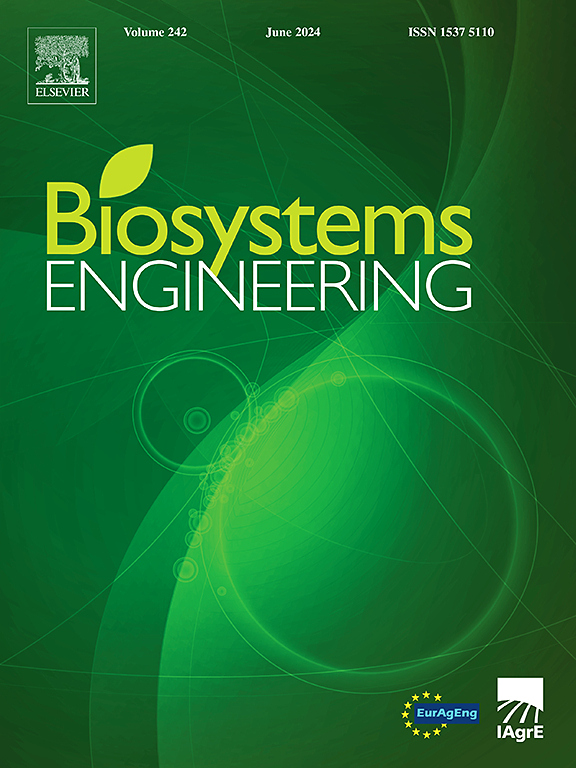Evaluation of the transmissibility of vibration and dynamic behaviour of coffee plants under field conditions
IF 4.4
1区 农林科学
Q1 AGRICULTURAL ENGINEERING
引用次数: 0
Abstract
Mechanical vibration-based harvesting can efficiently collect coffee fruits, but outcomes depend on machine type and plant factors. Therefore, it is crucial to determine the modal properties involved in this process. In this context, this study aimed to determine the dynamic behaviour of coffee plants through frequency scanning tests, considering different scenarios related to the plant and the ripening stages of the fruit. For this purpose, instrumentation was applied to fifteen plants chosen at random to collect field data for evaluating different scenarios. Through the induction of mechanical vibrations, it was possible to determine the vibration transmissibility in coffee plants, with 20 Hz induced frequency leading to greater transmissibility than the other induced frequencies. The dynamic behaviour of the coffee plants was evaluated using frequency sweep tests, which revealed a greater incidence of natural frequency peaks concentrated above 40 Hz. The analysis indicated that the selective harvesting of coffee fruits through the exclusive application of vibration is impractical in Arabica coffee plants. This is due to the absence of significant differences in the pending loads of fruits at different stages of maturation and the overlap in the frequency values identified in the investigated frequency bands.
咖啡树在田间条件下振动传递性和动态特性的评价
基于机械振动的收获可以有效地收集咖啡果实,但结果取决于机器类型和植物因素。因此,确定这一过程中涉及的模态属性是至关重要的。在此背景下,本研究旨在通过频率扫描测试确定咖啡植物的动态行为,考虑到与植物和果实成熟阶段相关的不同情况。为此目的,对随机选择的15个植物应用了仪器来收集现场数据,以评估不同的情景。通过机械振动的诱导,可以确定咖啡树的振动传递率,20 Hz的诱导频率比其他诱导频率的传递率更大。利用频率扫描试验评估了咖啡树的动态行为,结果显示,集中在40 Hz以上的固有频率峰值发生率更高。分析表明,在阿拉比卡咖啡树中,通过单独应用振动来选择性收获咖啡果实是不现实的。这是由于果实在不同成熟阶段的待处理负荷没有显著差异,并且在所调查的频带中确定的频率值存在重叠。
本文章由计算机程序翻译,如有差异,请以英文原文为准。
求助全文
约1分钟内获得全文
求助全文
来源期刊

Biosystems Engineering
农林科学-农业工程
CiteScore
10.60
自引率
7.80%
发文量
239
审稿时长
53 days
期刊介绍:
Biosystems Engineering publishes research in engineering and the physical sciences that represent advances in understanding or modelling of the performance of biological systems for sustainable developments in land use and the environment, agriculture and amenity, bioproduction processes and the food chain. The subject matter of the journal reflects the wide range and interdisciplinary nature of research in engineering for biological systems.
 求助内容:
求助内容: 应助结果提醒方式:
应助结果提醒方式:


